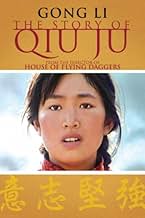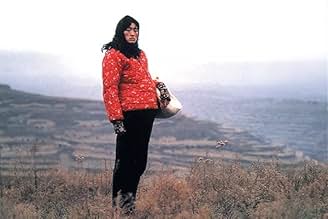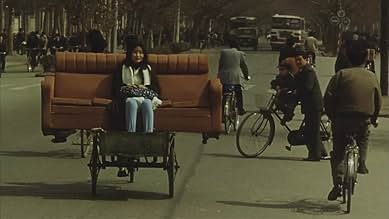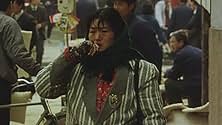CALIFICACIÓN DE IMDb
7.5/10
7 k
TU CALIFICACIÓN
Agrega una trama en tu idiomaA peasant woman seeks justice after the headman of her village has kicked her husband in the groin.A peasant woman seeks justice after the headman of her village has kicked her husband in the groin.A peasant woman seeks justice after the headman of her village has kicked her husband in the groin.
- Dirección
- Guionistas
- Elenco
- Premios
- 19 premios ganados y 9 nominaciones en total
- Dirección
- Guionistas
- Todo el elenco y el equipo
- Producción, taquilla y más en IMDbPro
Opiniones destacadas
Really enjoyed this one. Qiu Ju is the wife of a man who has been kicked by a neighbor, his village chief. She presses for an apology, largely (if subtitles do it justice) because, even though his chest is what hurts longer, he's been kicked in the "privates" and she wants more than one child. She takes her quest for the apology up the chain of officialdom.
I couldn't get enough of the scenery - houses, city, carts, clothes, painted paper banners, dried peppers and corn - and the faces of people. As other viewers noted positively, the people in it didn't seem to be actors but real people, caught up in daily affairs and catching us up, too. The nearby village is somewhat familiar to her, but her trip to the city may have been her first. Watching her trying to find her way around, haggling for fair rates and help from a produce buyer, a bike-cart driver, a letter writer, a hotelier, and a lawyer was a lot of fun. Her trips seemed like a great introduction to the culture.
One of the things I loved was how the families and neighbors kept having complex interactions with each other throughout the ordeal. And the social roles in this were interesting: Farm/village chief to farmer, sister to sister, daughter-in-law to her in-laws, Party officials to their hierarchy and to citizens, country to city, women's role in general (as in what sex babies are preferred) and the strong stance of a specific woman like Qiu Ju, who seemed to be empowered as much as frustrated by the system and by her family and neighbors.
I read reviews of this as a negative comment on bureaucracy. If so, it showed a remarkably humane one. Flaws were on display but the overall tone was of acceptance.
The sudden ending left me feeling for the main characters. I seemed to see a judgment in it, but wasn't sure what that judgment was. I wanted to know how the story was interpreted in China, so I came to IMDB to at least see how others took it.
I couldn't get enough of the scenery - houses, city, carts, clothes, painted paper banners, dried peppers and corn - and the faces of people. As other viewers noted positively, the people in it didn't seem to be actors but real people, caught up in daily affairs and catching us up, too. The nearby village is somewhat familiar to her, but her trip to the city may have been her first. Watching her trying to find her way around, haggling for fair rates and help from a produce buyer, a bike-cart driver, a letter writer, a hotelier, and a lawyer was a lot of fun. Her trips seemed like a great introduction to the culture.
One of the things I loved was how the families and neighbors kept having complex interactions with each other throughout the ordeal. And the social roles in this were interesting: Farm/village chief to farmer, sister to sister, daughter-in-law to her in-laws, Party officials to their hierarchy and to citizens, country to city, women's role in general (as in what sex babies are preferred) and the strong stance of a specific woman like Qiu Ju, who seemed to be empowered as much as frustrated by the system and by her family and neighbors.
I read reviews of this as a negative comment on bureaucracy. If so, it showed a remarkably humane one. Flaws were on display but the overall tone was of acceptance.
The sudden ending left me feeling for the main characters. I seemed to see a judgment in it, but wasn't sure what that judgment was. I wanted to know how the story was interpreted in China, so I came to IMDB to at least see how others took it.
The movie is a comedy, and a comedy only. Should the content go a bit deeper, it will surely be banned. In the communist system (under which I was raised), the "face" (reputation), not the truth, is supremely important. If the ruling government (or person) is portrayed by a story in any unfavorable light, the movie will simply not meet any audience except the censor review board.
In this movie, only a village cadre is selected as the bad guy, who kicked someone's private part. Then Qiu Ju, the victim's wife, went on a pilgrimage to seek justice for her husband. What if this bad guy is the mayor of a major City or higher? In that case, Qiu Ju may very likely get murdered and disappear into thin air. One person's life in China is not viewed precious like in the West. Power-play removes anyone in the way: even LIU Shao-qi, the 2nd-man in power before the Cultural Revolution of 1966, was gotten rid of because he endangered Mao's position (like to see a movie on that story, but it's guaranteed banned material in China).
Qiu Ju is admirable because she is earnest and persistent. Getting to one level without seeing justice done, she moves on. For the majority of the people in China, they would have given up. If this spirit gets into everybody in China, we will see a revolution. The student's movement in Beijing (1989) was one of such, and the result: blood shedding. Whole country learned from the incident to shut up. Where is Qiu Ju's persistence then? When will the freedom of speech (like what we enjoy at this forum) be granted in China? When will the Internet be truly open to the average Qiu Ju in China?
So to get this movie approved and circulated, the bad guy in this movie got what he deserved: put in prison, though Qiu Ju only demanded an apology from the Village-head. She would hate to find the village-head tortured in prison (Qiu Ju may not know it, but oh yes, there is severe torture in China's prisons all over the country) or even sent to labor camp where one would wither away. The truth behind this movie is: China's bureaucrats never listen to people's voice. And why would they? They are appointed at high levels, not elected. If you cannot have free speech publicly, how can you do anything according to conscience publicly?
Enjoy Qiu Ju's story and its colorful and rich portrayal of life in China, but don't follow her spirit if you are in China: you could get... (oh help... help me... someone is pulling my plug... !!!)
In this movie, only a village cadre is selected as the bad guy, who kicked someone's private part. Then Qiu Ju, the victim's wife, went on a pilgrimage to seek justice for her husband. What if this bad guy is the mayor of a major City or higher? In that case, Qiu Ju may very likely get murdered and disappear into thin air. One person's life in China is not viewed precious like in the West. Power-play removes anyone in the way: even LIU Shao-qi, the 2nd-man in power before the Cultural Revolution of 1966, was gotten rid of because he endangered Mao's position (like to see a movie on that story, but it's guaranteed banned material in China).
Qiu Ju is admirable because she is earnest and persistent. Getting to one level without seeing justice done, she moves on. For the majority of the people in China, they would have given up. If this spirit gets into everybody in China, we will see a revolution. The student's movement in Beijing (1989) was one of such, and the result: blood shedding. Whole country learned from the incident to shut up. Where is Qiu Ju's persistence then? When will the freedom of speech (like what we enjoy at this forum) be granted in China? When will the Internet be truly open to the average Qiu Ju in China?
So to get this movie approved and circulated, the bad guy in this movie got what he deserved: put in prison, though Qiu Ju only demanded an apology from the Village-head. She would hate to find the village-head tortured in prison (Qiu Ju may not know it, but oh yes, there is severe torture in China's prisons all over the country) or even sent to labor camp where one would wither away. The truth behind this movie is: China's bureaucrats never listen to people's voice. And why would they? They are appointed at high levels, not elected. If you cannot have free speech publicly, how can you do anything according to conscience publicly?
Enjoy Qiu Ju's story and its colorful and rich portrayal of life in China, but don't follow her spirit if you are in China: you could get... (oh help... help me... someone is pulling my plug... !!!)
Most Chinese movies are about victims of the culture or political system or how beautiful you men and women are kept apart or forced together by forces outside their control. This movie is completely different. It is a simple story about the ordinary Chinese people you can meet on the street and in their homes today and their ordinary lives. It is an amazingly accurate portrayal, unlike anything I have seen before. I only spent 3 weeks in China, but this movie brought back the feel of China, its people, and organizations.
Qxi Ju wants an apology from the Chief of the commune for kicking her husband in the groin. This is a story about her travels from the commune to the big city to try to get action from various bureaucracies. Although she is treated kindly and with much respect by the bureaucrats, she never gets exactly what she wants. It is fun to watch naive country girl Qxi Ju quickly learn about master doing things in the big city.
For me, the plot in this movie is secondary. It is each of the simple scenes that make this movie wonderful: The doctor's office is heated by a wood stove and the doctor chops the wood and feeds the fire. Qxi Ju's sister gives here a ride to town on the back of her bicycle on a snow covered unpaved road. They use dried chili peppers to trade for money to get a ride to the next town. Qxi Ju negotiates for the price of each thing she buys. The scenes all seem so realistic and beautifully photographed.
Yimou Zhang also made "Raise the Red Lantern" which gets higher praise, but that movie is about a world that is harder for me to relate to. This movie is like real life and real people and China today.
Qxi Ju wants an apology from the Chief of the commune for kicking her husband in the groin. This is a story about her travels from the commune to the big city to try to get action from various bureaucracies. Although she is treated kindly and with much respect by the bureaucrats, she never gets exactly what she wants. It is fun to watch naive country girl Qxi Ju quickly learn about master doing things in the big city.
For me, the plot in this movie is secondary. It is each of the simple scenes that make this movie wonderful: The doctor's office is heated by a wood stove and the doctor chops the wood and feeds the fire. Qxi Ju's sister gives here a ride to town on the back of her bicycle on a snow covered unpaved road. They use dried chili peppers to trade for money to get a ride to the next town. Qxi Ju negotiates for the price of each thing she buys. The scenes all seem so realistic and beautifully photographed.
Yimou Zhang also made "Raise the Red Lantern" which gets higher praise, but that movie is about a world that is harder for me to relate to. This movie is like real life and real people and China today.
This is a small thing, but ripe, all about learning to naturally go out among life.
This is is first in the story. A wife demands to know why her husband was kicked "where it hurts" by a local official. Why did he do it? She ventures out in the village, then down in the city in search of answers. The tip of the thread that humorously guides us through different faces so that altogether we get a snapshot of Chinese life.
A constable arbites and gives his verdict, which seems perfectly reasonable, the accused will cover medical expenses and both parties are made aware that they were both wrong. But the wife is not pleased, she wants a more significant justice, and will go through the state apparatus looking for it.
This has led some viewers to think that we're meant to be seeing an individual being caught in the gears of an absurd and uncaring bureaucracy; that seems to be a handy interpretation we have in the West ever since Kafka. But that's not the point being made here.
Party officials, whenever encountered, are always benevolent and trying to be fair, quietly exasperated by the antics of the people in their charge. A higherup is kind enough to drive her back to the hotel on his car, another one stoically returns someone's stray animal. You can see why this among Zhang's early work was not banned over there.
But every new verdict from higher offices remains the same however, which is to say, the world is just so, maybe not ideal. Why make a fuss about why we do things, why stand so rigidly? There's no deeper reason sometimes and we're better off mending ourselves by moving forward, going along unconstrained by "right" and "wrong". This is often hard to translate to someone in the West because we have made ourselves stupid by arguing from principle instead of seeing what the specific thing in front of us calls for now.
And the notion of contrived uncontrivance extends in everything else. Zhang is aiming for a snapshot of life whereby we just mingle with things, what they used to call "neorealism" back in the day. The view it ventures to offer will be precious, a heartland generally closed to us.
More pertinently for me, it evokes a view of life, a warmth and sense of community I like. Lovingly obstinate in trying to fathom its tempests, pettiness without malice, quiet perseverance in simple things. Zhang lets all of this envelop in a natural way, as impulse that climbs up through the soles of the feet.
Gong Li is perfectly in tune with this, sublime in erasing any trace of an actor's face behind the shawl, making herself like a stump of uncontrived urges. We're meant to see that though a kind person, she's also a little dull in her fixation to an apology. And look how naturally she comes forth from her body, then watch her as the nervous empress in Golden Flower. What a range in which she moves freely.
This is is first in the story. A wife demands to know why her husband was kicked "where it hurts" by a local official. Why did he do it? She ventures out in the village, then down in the city in search of answers. The tip of the thread that humorously guides us through different faces so that altogether we get a snapshot of Chinese life.
A constable arbites and gives his verdict, which seems perfectly reasonable, the accused will cover medical expenses and both parties are made aware that they were both wrong. But the wife is not pleased, she wants a more significant justice, and will go through the state apparatus looking for it.
This has led some viewers to think that we're meant to be seeing an individual being caught in the gears of an absurd and uncaring bureaucracy; that seems to be a handy interpretation we have in the West ever since Kafka. But that's not the point being made here.
Party officials, whenever encountered, are always benevolent and trying to be fair, quietly exasperated by the antics of the people in their charge. A higherup is kind enough to drive her back to the hotel on his car, another one stoically returns someone's stray animal. You can see why this among Zhang's early work was not banned over there.
But every new verdict from higher offices remains the same however, which is to say, the world is just so, maybe not ideal. Why make a fuss about why we do things, why stand so rigidly? There's no deeper reason sometimes and we're better off mending ourselves by moving forward, going along unconstrained by "right" and "wrong". This is often hard to translate to someone in the West because we have made ourselves stupid by arguing from principle instead of seeing what the specific thing in front of us calls for now.
And the notion of contrived uncontrivance extends in everything else. Zhang is aiming for a snapshot of life whereby we just mingle with things, what they used to call "neorealism" back in the day. The view it ventures to offer will be precious, a heartland generally closed to us.
More pertinently for me, it evokes a view of life, a warmth and sense of community I like. Lovingly obstinate in trying to fathom its tempests, pettiness without malice, quiet perseverance in simple things. Zhang lets all of this envelop in a natural way, as impulse that climbs up through the soles of the feet.
Gong Li is perfectly in tune with this, sublime in erasing any trace of an actor's face behind the shawl, making herself like a stump of uncontrived urges. We're meant to see that though a kind person, she's also a little dull in her fixation to an apology. And look how naturally she comes forth from her body, then watch her as the nervous empress in Golden Flower. What a range in which she moves freely.
Gong Li, China's top actress in the 1990s (deservedly so), plays a naive but determined innocent, a young married woman from a remote farming village who wants nothing more than to have the village elder apologize to her husband for kicking him in a fit of anger. The bureaucratic nightmare she endures, making repeated trips to "the city" to seek justice, exposes her to a system she didn't know existed, a completely convoluted and impregnable one that operates solely by standards and practices, totally devoid of compassion or an understanding of the people it governs.
This is a small film, an earlier work by master Chinese filmmaker Zhang Yimou (To Live, Ju Dou), but what really makes it work is Gong as Qiu Ju. Every effect of this effectless society registers on her face, mostly in the form of surprise at the promises unkept and disappointment at the lack of concern by officials who are supposed to be responsible to "the people." She makes us care deeply about Qiu Ju, even though we may not be able to identify directly with her circumstances, but even beyond this, she makes these provincial circumstances universal by being the everywoman, someone who just wants the people in charge to do what's right without it necessarily having any adverse impact on themselves. Gong's ability to inject political situations with sincere human emotion has made her an ideal representative of the message running through all of Zhang's films (she has appeared in several of them), but beyond this, she simply is a great actress who should eventually become as world renowned as Joan Chen once was.
What makes this film even more prescient is how well many Americans may identify with the nightmares presented by a government hierarchy overstuffed with "I just work here" bureaucrats. And the ending is infused with a poignant irony that will hit home with anyone who has, in their own lives, found that time heals all wounds.
This is a small film, an earlier work by master Chinese filmmaker Zhang Yimou (To Live, Ju Dou), but what really makes it work is Gong as Qiu Ju. Every effect of this effectless society registers on her face, mostly in the form of surprise at the promises unkept and disappointment at the lack of concern by officials who are supposed to be responsible to "the people." She makes us care deeply about Qiu Ju, even though we may not be able to identify directly with her circumstances, but even beyond this, she makes these provincial circumstances universal by being the everywoman, someone who just wants the people in charge to do what's right without it necessarily having any adverse impact on themselves. Gong's ability to inject political situations with sincere human emotion has made her an ideal representative of the message running through all of Zhang's films (she has appeared in several of them), but beyond this, she simply is a great actress who should eventually become as world renowned as Joan Chen once was.
What makes this film even more prescient is how well many Americans may identify with the nightmares presented by a government hierarchy overstuffed with "I just work here" bureaucrats. And the ending is infused with a poignant irony that will hit home with anyone who has, in their own lives, found that time heals all wounds.
¿Sabías que…?
- TriviaThe Chinese title is "Qiu Ju Files a Lawsuit"
Selecciones populares
Inicia sesión para calificar y agrega a la lista de videos para obtener recomendaciones personalizadas
- How long is The Story of Qiu Ju?Con tecnología de Alexa
Detalles
Taquilla
- Total en EE. UU. y Canadá
- USD 1,890,247
- Fin de semana de estreno en EE. UU. y Canadá
- USD 25,785
- 18 abr 1993
- Total a nivel mundial
- USD 1,890,247
- Tiempo de ejecución
- 1h 40min(100 min)
- Color
- Relación de aspecto
- 1.85 : 1
Contribuir a esta página
Sugiere una edición o agrega el contenido que falta























